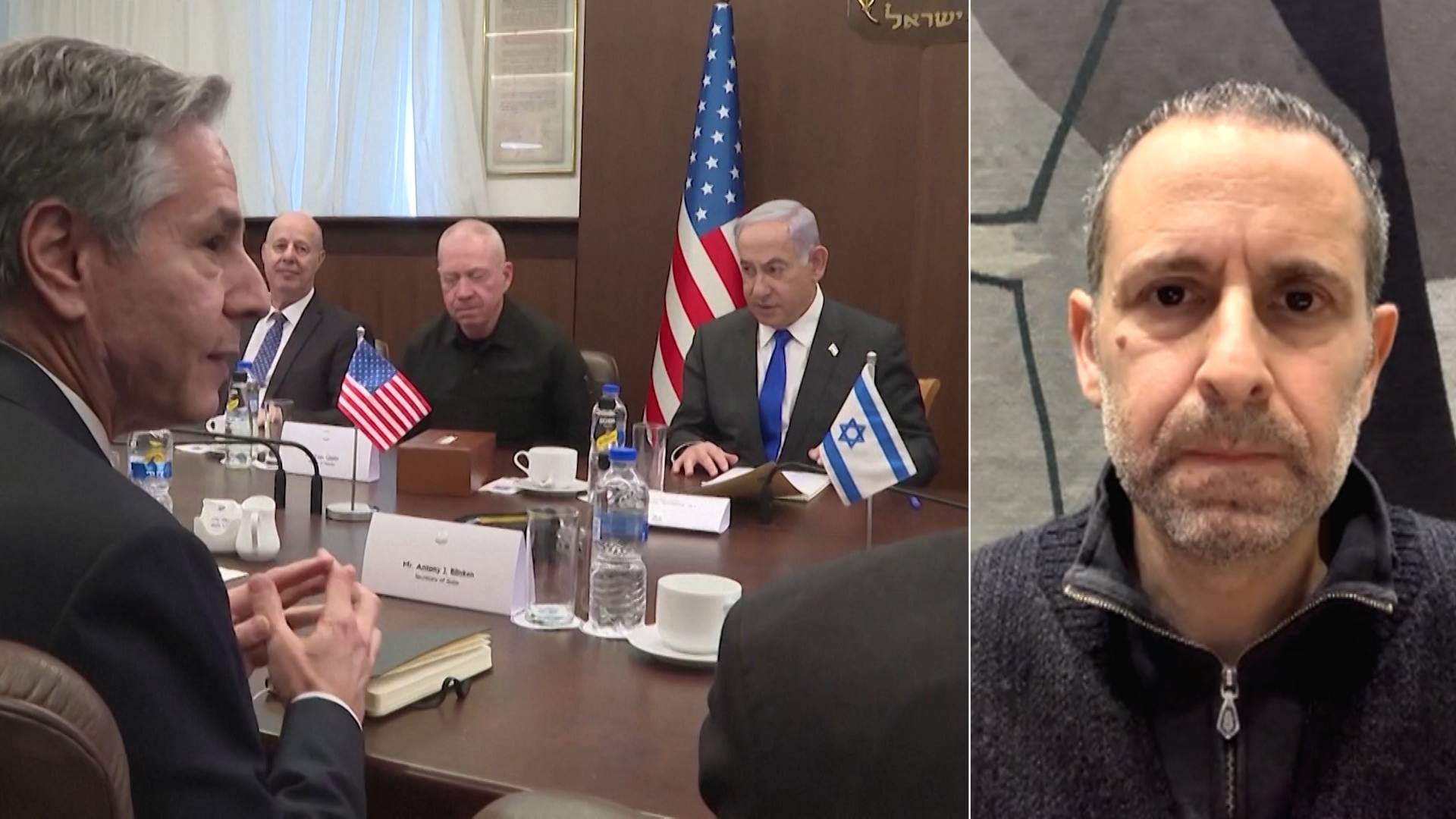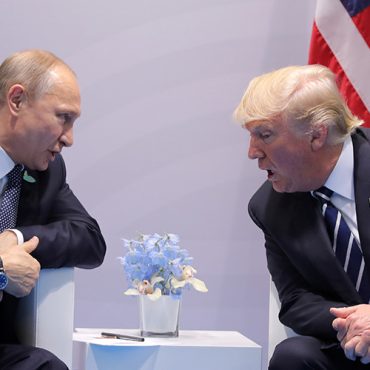This is a rush transcript. Copy may not be in its final form.
NERMEEN SHAIKH: This is Democracy Now!, democracynow.org, The War and Peace Report. I’m Nermeen Shaikh in New York, joined by Amy Goodman. Hi, Amy.
AMY GOODMAN: Hi, Nermeen. Welcome to all our listeners and viewers around the country and around the world.
NERMEEN SHAIKH: Hamas has put forward a detailed plan for a new ceasefire deal aimed at ending Israel’s assault on Gaza. The plan is a response to a proposal drawn up two weeks ago by the U.S., Israel, Qatar and Egypt. The Hamas counterproposal, which was introduced late Tuesday night, envisions three phases of 45 days each.
In the first phase, Hamas would release all female Israeli hostages, males under 19 and elderly and sick people in exchange for Palestinian women and children held in Israeli jails. Israel would also withdraw from populated areas in Gaza, cease aerial operations, allow far more aid to enter, and permit Palestinians to return to their homes, including in northern Gaza.
The second 45-day phase, to be negotiated during the first, would include the release of all remaining hostages, mostly soldiers, in exchange for more Palestinian prisoners, and Israel would complete its withdrawal from Gaza.
In the third phase, the sides would exchange the remains of hostages and prisoners.
President Biden commented on Hamas’s counterproposal on Tuesday, calling it, quote, “a little over the top.”
PRESIDENT JOE BIDEN: There is some movement. And I don’t want to — I don’t want to — let me choose my words. There’s some movement. There has been a response from the — there has been a response from the opposition. But —
REPORTER: Hamas?
PRESIDENT JOE BIDEN: Yes, I’m sorry, from Hamas. But it seems to be a little over the top. We’re not sure where it is. There’s a continuing negotiation right now.
NERMEEN SHAIKH: Secretary of State Antony Blinken arrived in Israel overnight after meetings on Tuesday in Egypt and Qatar. He will meet with Israeli Prime Minister Benjamin Netanyahu and President Isaac Herzog, among others, to discuss Hamas’s response to the proposed deal. Blinken will also meet Palestinian Authority President Mahmoud Abbas later today.
As the negotiations continue, Israel’s assault on Gaza is entering its fifth month. Over 27,500 Palestinians have been killed and nearly 67,000 wounded since October 7th. While the vast majority of Gaza’s population have been driven from their homes, much of the territory has been destroyed or severely damaged, and a quarter of the population is facing starvation.
For more on the ceasefire negotiations, we’re joined by Daniel Levy, president of the U.S./Middle East Project and a former Israeli peace negotiator under Prime Ministers Ehud Barak and Yitzhak Rabin.
Daniel Levy, welcome to Democracy Now! If we could just begin with your assessment of the negotiations, how they’ve been proceeding so far, and what you anticipate Israel’s response might be to the counterproposal offered by Hamas?
DANIEL LEVY: Well, we do now have a detailed position that has been put out in the public domain. You referenced that. I think a crucial thing to say about this is that what Hamas have said is that it’s not that we can do phase one, move on to phase two, move on to phase three, is that there has to be an agreement upfront that this is going to deliver a final ceasefire.
Now, we’ve heard not detailed counterproposals from the Israeli side — we don’t have that. What we have heard is Prime Minister Netanyahu making clear that he will not accept a permanent ceasefire, he will not redeploy his troops out of Gaza, and has also been circumspect on what kind of Israeli prisoner exchange would be on the table. That suggests that the parties are still really quite some distance apart, that there’s an element of blame game, not being attributed with blame, and there’s an element of where more could one take the negotiations.
I think, Nermeen, that will be partly dependent on three factors — firstly, the balance of forces on the battlefield. This has not gone as Israel had anticipated, as Israel had hoped, as Israel’s maximalist war game — war claims had set out. Israel is, yes, operating in Gaza. We’ve seen the terrible destruction. You’ve gone through that, the level of death, of civilian death, of child death, the disease and starvation now. But we are not seeing Hamas’s resilience wane. So, on the battlefield, that is still something of a stalemate.
The second vector is internal pressure. Now, there is internal pressure inside Israel from the families. There are some inside the war cabinet who have said this needs to change direction.
The third vector — and here’s where we get to the Blinken visit, Nermeen — the third vector is what are the external dynamics of pressure. We have had what South Africa has done at the International Court of Justice, which I think was very significant. What we do not have is an American secretary of state empowered to use leverage, to put on the table a disincentive, a cost structure for Israel to continue this, and therefore, I think we’re stuck. What you instead have — curiously, perhaps — is an attempt to almost do an end run and to tie in postwar plans with the ceasefire. Now, that could be a good thing, right? This didn’t begin on October 7th, four months ago today. There are root causes that absolutely need to be addressed, if Palestinians or Israelis are going to have to have security in the future. But Blinken seems to be putting on the table some pretty magical thinking, which has partly been set out in articles by Tom Friedman and David Ignatius and, I think, are going to cause more problems. And maybe that’s something we can touch on.
AMY GOODMAN: And, Daniel Levy, if you can talk about the role of Qatar, the role of Egypt in these negotiations? Right now Blinken is meeting with Netanyahu. And what, ideally — and you, as a negotiator, know the significance of negotiations — Blinken needs to say to Netanyahu? While Blinken has continually said he’s heartbroken and gut-wrenched over the fatalities in Gaza, what he’s continued to do is provide weapons to Israel, an end run around Congress twice to ensure artillery shells go to them. So, whatever he feels or says he is feeling, the significance of what the U.S. is doing in shoring up Netanyahu?
DANIEL LEVY: That is crucial, Amy, because some may have heard the president say, “Well, it seems like the Hamas position is a little too much.” Some may consider the provision of 2,000-pound bombs by the U.S. to Israel, after everything we’ve seen, a little too much. Some may consider that when there is a plausible case for genocide at the International Court of Justice and you’re ignoring those provisional measures, a little too much.
So, what we have is a Qatari and Egyptian party — because there are no direct negotiations with Israel, between Israel and Hamas. So you have the mediators from the region who are talking to Hamas. They can try and lean on Hamas. If Hamas does not feel that it has to concede further, it will not. The question is, as you have noted: Will the U.S. lean on Israel? Now, it seems that rather than coming and saying, “There’s a cost for you to do this,” what Secretary Blinken is attempting to do is say, “You know what? I’m going to reward you. You know what I’ve got in my back pocket? I’ve got Saudi normalization.” Now, the Saudis have poured some cold water on this in a statement that they issued overnight to contradict something that spokesman Kirby said. But Blinken is hoping that this could somehow push a deal over the line.
I think this demonstrates, first of all, naivety. We’ve had normalization with the UAE and others in the past, and it only encouraged Israeli extremism. It’s layers and layers of make-believe, the idea that you can have Western-appointed Palestinian technocratic leaders somehow run the Palestinian side with no credibility on their own people, these limited measures against Israeli settlers that the administration took, when the problem is not a few bad apples. The problem is the state structure of occupation and oppression.
So, it seems that there’s another effort here by the administration to say, “We can stop ethnic cleansing. We can stop this displacement.” But — and here’s one of the big problems, I think — what is on offer is not Palestinian statehood. It’s not that anyone is saying, “Israel will withdraw. The army will be out. You’ll have recognition of a viable state that’s actually going to exist, with Jerusalem as its capital. Then we can deal with refugees and other things.” What is apparently on offer is a little bit of verbiage in exchange for Saudi normalization.
And what this is, really, Amy, is this is an attempt to reentrench, to refreeze the existence of a Bantustan, and the use of partition as a tool of violence in ensuring a future apartheid. And I think that’s a pernicious thing to offer Palestinians: You can either have ethnic cleansing or apartheid. Because what is not on the table is justice or genuine peace. And to be quite honest, if the U.S. administration wants to make a deal with the Saudis to export more arms, maybe have some companies do well over a civilian energy program, as a geopolitical move to try and slow down de-dollarization, don’t pretend that this is a peace move to end the horrors in Gaza, because this is a geopolitical maneuver, not a genocide avoidance maneuver.
AMY GOODMAN: And what about the role of Qatar and Egypt in this, and how you feel this is going to play out, in the midst of these so-called negotiations, that are coming close to yet another — Blinken won’t use the word “ceasefire,” he talks about pause — the threat of a ground invasion of Rafah, where hundreds of thousands of Palestinians have fled? What, something like 2 million Palestinians are there, just on the tip of Gaza, on the Egyptian border.
DANIEL LEVY: Well, as you say, Palestinians have been moved from one location to the other, and then, every time, the area they’re told to move to, that becomes bombed. That’s the story with Khan Younis today. That’s the story with Rafah tomorrow.
Qatar can, and has — and we saw the first pause, and we saw releases. So, there’s magical thinking that there’s a non-negotiated path to saving the hostages. Unfortunately, those numbers are smaller than what was previously talked about. There is a negotiated path. But Qatar and Egypt can only work with what they have from the Israeli side. And if they have something that is woefully falling short of what is needed — because on the Israeli side there is division, there’s an unwillingness to make those hard decisions — they are not going to be able to deliver on the back of that.
Now, Egypt has another concern, which is that Israel still hopes and holds a plan for the mass displacement of Palestinians in Gaza into Egypt, given the horrendous conditions there. And if Israel takes over the Rafah border crossing with Egypt, I think that exacerbates those concerns. You’ve had Egypt make statements to the effect of that not being something that can happen, as far as they are concerned.
So, you have the role of the mediators. Perhaps what Netanyahu is hoping is that he can get some of the hostages out — because there is pressure — without having to concede on the other issues. So, perhaps they’re hoping that phase one happens. I don’t think it’s going to happen at that low cost. What the Americans seem to hope is that they can drive a wedge between Netanyahu, Smotrich and Ben-Gvir, and that Netanyahu, if faced with the opportunity, for instance, of a deal with Saudi Arabia, will not be able to stand down public pressure. I think this is more American naivety, American failure to learn the lessons of history, because I think Netanyahu will turn around and say, “I can get a better deal, maybe not now, maybe not with this president. But, look, I got those Abraham Accord deals while giving nothing, and I’ll get something this time.”
So, again, what does it boil down to? It boils down to whether this administration, this president, actually wants to create circumstances in which Israel has hard choices to make, in which genuine American leverage is on the table. If not, we’ll continue to depend on battlefield dynamics, which aren’t going well, on Israeli internal pressure, and we risk further regional escalation, which has gone up again in the last weeks. And America is apparently willing to risk being further entangled yet again in Middle East wars, because it is unwilling to stare down an Israeli leader who has his own political survival at stake — perhaps that’s true of the president here, as well — and who is insistent on maintaining his apartheid regime.
NERMEEN SHAIKH: Well, Daniel Levy, I want to go back to a comment that you made about Saudi Arabia, the normalization of ties between Saudi Arabia and Israel being one of the principal incentives being offered. But there are also questions being raised, which I’m sure the Saudis are aware of, that the U.S. promises to Saudi Arabia are not likely to be accepted by Congress, even if this goes ahead, including a defense pact, as well as technical support to Saudi Arabia to develop a nuclear power industry. And it’s also unclear, as has been reported, that Netanyahu sees Saudi normalization and the continuation of U.S. support as essential to his survival. I don’t know if you agree with that. Do you think that’s true, since it does seem clear that his principal objective, Netanyahu’s, for reasons that we’ve covered on the show, his principal aim, is to remain in power?
DANIEL LEVY: Prime Minister Netanyahu is a leader who now has the legacy of October 7th hanging over him. [inaudible] in court facing criminal charges. Does he — can you still hear me?
NERMEEN SHAIKH: Go ahead, Daniel.
DANIEL LEVY: Thank you. He is, therefore, making a daily calculation of how does he keep this going. Now, right now it is more important for him to maintain his coalition rather than to go on this journey to Saudi normalization — something he wants, but not at any cost. And as I have said, he can turn around to the Israeli public and say, “Don’t worry, the Americans want me to give up things which are too much for Israel to give up. My parliamentary opponents are willing to give them up, but not me. I will get a better deal.” So that’s on the Netanyahu side of things. He does not feel that he is in a corner yet.
On the Saudi side of things, the Saudis, of course, why not, if you’re in their position, say, “Let’s see what more we can get from the Americans. Let’s see what more they will put on the table. If there’s enough on the table, maybe there are circumstances under which we will do this. And if not, at least we’ve already now got an American offer, which we can use in the future and see where else this can go”? So, what you have is an Israeli side quite effective at playing the administration, a Saudi side quite effective at playing the administration — and, you know, I don’t take joy in saying this — but a very weak, very ineffective and self-harming government in Washington, D.C.
AMY GOODMAN: Daniel Levy, I want to go back to something you said. You referred to an apartheid regime, being the Israeli government. You also talked about the Bantustan. Now, this is very significant, given who you are, a former Israeli peace negotiator under Prime Ministers Ehud Barak as well as Yitzhak Rabin, we’ll remind people, was killed by a Jewish extremist, was assassinated. Explain what you mean by “Bantustan.” And then talk about where you see this going, and how painful it was to see President Biden yesterday. He couldn’t remember the name Hamas, really cognitively stumbling there, but then saying Hamas’s proposal is “over the top.”
DANIEL LEVY: Look, on that latter point, I can’t comment on — oh, I can comment, but I have no special insight into the decision-making that has a reality in this country where that is the nature of the candidate being put forward. I imagine, and my assessment would be, that that community of people, a sizable community, who see a significant, massive importance in an outcome in the election in which Donald Trump does not return to the White House — I imagine they would see it as crucial that everything be done so that the alternative to Trump is a president who is someone as broad a coalition as possible can vote for, certainly amongst those who previously voted for him. And therefore, I hope that those other groups, who have such a strong interest in that Trump outcome not materializing, would be pressuring the administration to change its policy on aiding, abetting and arming what the highest court in the world, the International Court of Justice, has plausibly said is a genocide, rather than beating up on people in Michigan and elsewhere who say, “I can’t. I cannot vote for this man.” So, that’s on the American side.
In terms of what I have witnessed previously as a negotiator and the assessment I made with regard to the apartheid reality and the offer of a Bantustan, there was a two-state option, which was an incredibly good deal for Israel, not the partition plan that the U.N. voted on in 1947 to allow this Jewish state entity to come into existence — that partition plan voted on by a U.N. with virtually none of the decolonized states, right? You didn’t have an African, Asian, Global South, as we would call it, presence at the U.N. then to create the Jewish state. That gave Israel about 53, 54%. Today Israel has 78%. That was the basis on which the two-state negotiation took place.
Rather than grabbing this with both arms and saying, “My goodness, how do we — how do we go the extra mile so that we can get this remarkable deal?” rather than going there, the Israeli negotiating position over time — and I don’t know what would have happened had Rabin not been assassinated — but the negotiating position on the Israeli side, when the Palestinian leadership, the PLO, was ready to accept that, was to keep draining this Palestinian state, meaning not only would there be nothing on the refugees, not only would there be no truth and reconciliation, there would have to be an end of all claims, there would be demilitarization, there would be islands of Israeli settlement in this state — those islands kept getting bigger with every iteration of the map — nickel-and-diming on Jerusalem, on border crossings, on everything.
What we are left with, a quarter of a century after the deadline for completing those negotiations, is something that factually, legally, accurately resembles the Bantustans that existed under that apartheid regime. There’s no perfect symmetry, but the legal definition of apartheid, I think, has been strongly proven in the reports by the human rights organizations.
And so, what the Americans — and I think this is the difference between Biden and Bibi, if you like. Bibi is saying, “I’m not offering them a state. I’m offering them a Bantustan.” And Biden is saying, “God damn it, man, can’t you just call it a state?” We all know that it’s not a state, because what you have there is partition being used to create these tiny islands of Palestinian limited self-governance, so that the envelope of control is an Israeli regime which makes sure the Palestinians cannot have equal rights, cannot have security, cannot have a future. And that is always going to be a recipe for insecurity and an explosion, whether that’s one that impacts Israelis or one that impacts Palestinians. And to try and come out of this crisis and say the solution is to go back to squeezing things into that box, I think that is criminal.
NERMEEN SHAIKH: Well, Daniel Levy, we just have a minute, but if you could say what you think the significance of — you mentioned it earlier — dissent within the Israeli war cabinet, however minor, and popular opposition to the war continuing, to what extent that might actually make a difference with respect to the negotiations and what Israel is willing to concede?
DANIEL LEVY: Very important, Nermeen. So, first of all, you do have a camp inside Israel that is anti-apartheid, anti-occupation, amongst Jewish Israelis, who do see a different future, and Israelis will ultimately need a landing place in which they have a future and a home, just not at the expense of Palestinians.
You have a different camp, that’s not that camp. You have a parliamentary, a political and a much larger camp, which was against Netanyahu in that huge protest movement before October 7th, which continues not to trust Netanyahu, which believes that the release of the hostages should be a priority, and which, as was expressed by one of the ministers, Gadi Eisenkot, who lost a son in this war, believes that the goal that you can totally decimate Hamas is not realizable, and that Israel — he didn’t use this language, I will — should cut its losses.
So you do have strong internal pressure. Unfortunately, that is not enough yet to drive an end to this war, and it’s not being matched by the kind of external pressure we should be seeing from the U.S. administration.
NERMEEN SHAIKH: Well, thank you so much, Daniel Levy, president of the U.S./Middle East Project and a former Israeli peace negotiator under Prime Ministers Ehud Barak and Yitzhak Rabin.
When we come back, journalist Jeremy Scahill on “Netanyahu’s War on Truth.” Stay with us.











Post comments (0)